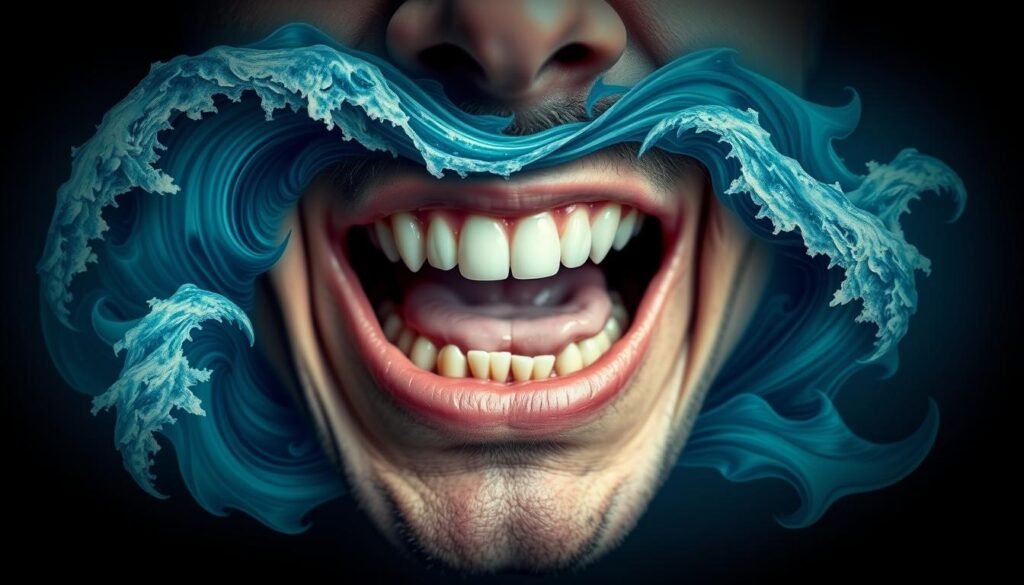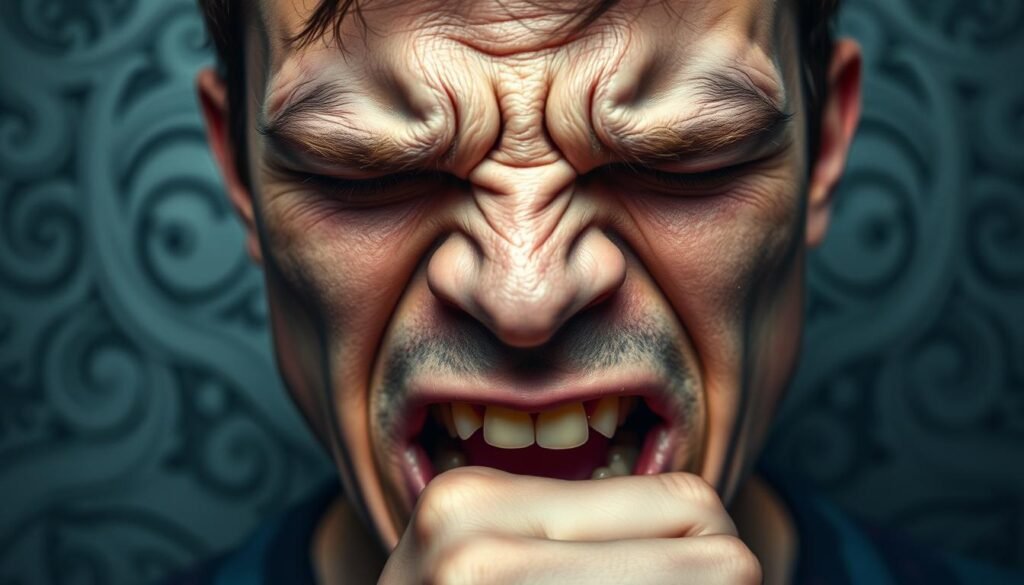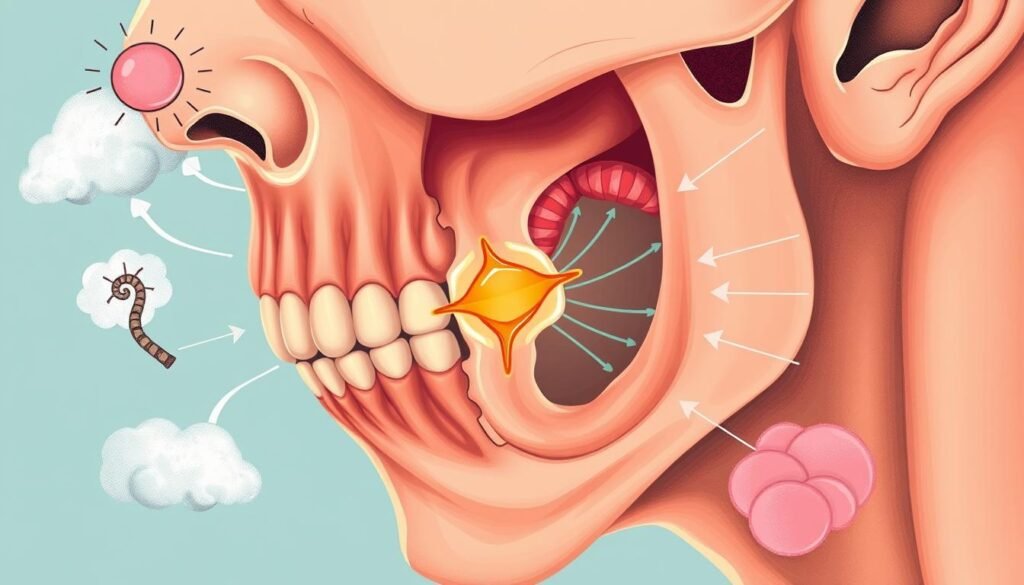About 80% of those with anxiety suffer from bruxism. This condition involves jaw clenching and teeth grinding. It’s an often-ignored side effect of anxiety that affects jaw tension. Understanding jaw tension anxiety and mental health is vital for finding the right management strategies.
When anxiety spikes, people can experience TMJ stress. This condition makes jaw muscles tight from too much worry. Symptoms include pain and trouble with teeth. Knowing about this link shows why dealing with anxiety matters for easing jaw tension. There are many ways to help, from therapy to simple home exercises, which improve comfort and mental well-being.
Key Takeaways
- Studies illustrate a strong association between anxiety disorders and bruxism, highlighting the need for effective management.
- Chronic TMJ disorders are often exacerbated by anxiety, leading to more severe symptoms.
- Cognitive Behavioral Therapy (CBT) is a successful approach for treating anxiety, impacting jaw tension positively.
- Mouthguards can provide immediate relief from jaw clenching and related pain.
- Self-care practices like stress management and relaxation exercises play a crucial role in controlling anxiety symptoms.
Introduction to Jaw Tension and Anxiety
Jaw tension anxiety often stems from too much emotional stress. Many with anxiety disorders notice their bodies respond with muscle tightness, especially in the jaw. This reaction is due to high stress levels, making mental and physical discomfort worse.
About 10 million Americans have temporomandibular joint (TMJ) disorders, often linked to jaw tension anxiety. Stress can lead to bruxism, where you clench or grind your teeth without realizing it. This habit can increase jaw pain and make anxiety worse, whether it happens during the day or at night.
Long-term jaw tension can cause many problems. It can mess up your sleep, change your mood, and lower your focus. TMJ pain and anxiety feed into each other, making each other worse. Managing this tension is vital to improve your mental and physical health.
Understanding the Connection Between Anxiety and Jaw Tension
Anxiety and physical symptoms are closely linked, especially when it comes to jaw muscle tension. People with anxiety disorders often find their jaw muscles tighten without meaning to. This can lead to discomfort or even pain. Research shows that long-term stress can cause this muscle tension, linking stress closely with anxiety symptoms.
The body’s “fight or flight” response triggers muscle tension when we feel threatened. This includes the jaw. Neurotransmitters cause the jaw to tighten unconsciously when we’re anxious. If anxiety continues, this tension can turn into a long-term problem, affecting dental health.
There’s a clear link between clenching the jaw and having anxiety disorders. People with anxiety might struggle more in their daily lives, which can make muscle tightness worse. Beyond the mental effects, this can lead to physical issues like temporomandibular joint dysfunction (TMD).
It’s important to tackle the anxiety connection for those with jaw tension. Treatments like cognitive behavioral therapy (CBT) and self-care can help relieve mental and physical stress. Managing anxiety can lead to less jaw tension and better overall health. For more details on handling relationship anxiety and its effects, click here.

Common Signs of Jaw Tension Anxiety
It’s vital to know the signs of jaw tension anxiety to tackle discomfort well. Many people talk about certain jaw tension symptoms. These can show if someone has anxiety. Knowing these signs helps people get the right help and feel better.
Symptoms of Jaw Tension
Common jaw tension symptoms include:
- Pain in the jaw or face
- Teeth grinding (bruxism)
- Clenching of the jaw
- Clicking or popping sounds when moving the jaw
- An uncomfortable bite
- Headaches or aches in facial muscles
Stress and jaw tension affect many people noticeably. Research shows a strong link between anxiety and bruxism. For more, visit this resource.
Symptoms of General Anxiety
General anxiety often comes with specific jaw problems. Anxiety signs include:
- Feeling restless
- Getting tired easily
- Hard time concentrating
- Being irritable
- Muscle tension
- Issues with sleeping
Many with anxiety also have jaw tension symptoms. Addressing both general anxiety symptoms and jaw tension is crucial for better health.

| Symptom Type | Common Symptoms |
|---|---|
| Jaw Tension Symptoms | Pain, Grinding, Clenching, Clicking |
| General Anxiety Symptoms | Restlessness, Fatigue, Irritability, Muscle Tension |
Causes of Jaw Tension Anxiety
Let’s dive into why jaw tension anxiety happens. It’s mainly due to how stress affects our health. When people are stressed, they feel a lot of emotional pressure and physical pain. And often, this leads to jaw tension as stress and anxiety levels shoot up.
Impact of Stress on Jaw Muscles
Stress doesn’t just touch your mind; it affects your body too, especially your jaw muscles. Anxiety doesn’t only cause feelings like upset stomachs or heart racing. It can also make your jaw hurt. This happens from tension in your face because of anxiety. That tension makes you clench your teeth, often while sleeping, known as bruxism. This can really hurt your jaw from all that pressure.
The mix of stress and anxiety can also make TMJ worse. TMJ is a jaw disorder that causes lots of pain, headaches, and trouble moving your mouth. Stress makes you clench or grind your teeth more, which makes TMJ symptoms hit harder.
| Common Symptoms of TMJ Disorder | Associated Stress Symptoms |
|---|---|
| Jaw pain | Emotional strain |
| Headaches | Increased anxiety levels |
| Difficulty opening and closing the mouth | Muscle tension in neck and shoulders |
| Unexplained dizziness | Sleep disturbances |
Understanding how stress, anxiety, and jaw tension are linked is key. Practicing mindfulness can help control the urge to clench your teeth when anxious. Getting professional help is crucial for dealing with the long-lasting impacts of anxiety on your dental health and easing your pain.
The Role of TMJ Disorders in Jaw Tension
TMJ disorders can significantly affect jaw tension, especially when linked to anxiety. Stress leads to the habit of teeth clenching and grinding. This habit contributes to TMJ disorders. These disorders cause jaw pain and make moving the jaw hard.
TMJ disorders have common symptoms. These include jaw pain, trouble chewing or talking, neck pain, and headaches. People might also feel pain in their face and hear their jaw click or pop. These symptoms can disrupt daily life and make sleeping difficult.

It’s important to tackle TMJ disorders head-on. If ignored, the symptoms can drag on from days to months. Anxiety makes the jaw muscles tense, worsening the pain. Lowering stress through exercise, better sleep, and seeking help can reduce symptoms.
Leaving TMJ unchecked is a bad idea; it affects jaw health in the long run. Using self-care, medical help, and changing lifestyle habits help those suffering. It’s essential to seek treatment early to avoid more problems and keep TMJ’s impact on life minimal.
If you’re interested in more about anxiety, there’s lots to learn. Anxiety can also cause frequent urination among other physical symptoms. Recognizing these signs can improve your health. Learn more about anxiety and urination by visiting how anxiety impacts urinary frequency.
Clenching and Bruxism: An Overview
Bruxism is when you grind or clench your teeth without meaning to. It usually happens because of stress or anxiety. This issue is serious. It affects not just your mouth but your whole health. Knowing how bruxism works is important. It helps us see different health problems and how we can manage them.
The Impact of Jaw Clenching on Oral Health
Grinding your teeth can lead to oral health problems. It wears down your enamel, making teeth sensitive and may lead to cavities. Those with bruxism might also have pain in their face, neck, and shoulders. They could get headaches, earaches, and bad sleep, which makes stress worse.
There are several factors that can cause bruxism:
- Stress and Anxiety: Stress and anxiety can make you more likely to grind your teeth.
- Medication Effects: Some medications, especially SSRIs, might cause teeth grinding as a side effect.
- Age and Development: Bruxism is more common in kids and teens but usually gets better as they grow up.
- Family History: If your family has a history of bruxism, you might be more likely to have it too.
Sleep bruxism can lead to other sleep problems, like sleep apnea. Dentists often suggest using mouth guards or splints at night. This helps protect your teeth.
It’s key to spot bruxism’s signs and reasons early. Dealing with it effectively is crucial. We need to handle both the mental and physical aspects that cause it. For deeper understanding, check this study on bruxism and emotional stability.
Effective Stress Management Techniques
Managing stress well can ease a tense jaw from anxiety. Stress management techniques provide relief and improve well-being. Adding these strategies to daily life helps reduce anxiety’s physical signs, like jaw discomfort.
Incorporating Relaxation Exercises
Relaxation exercises help fight stress and jaw tension. They promote calmness and lessen muscle tightness. Here are some effective methods:
- Meditation: Mindfulness lowers stress levels. It makes you aware of your thoughts and feelings, bringing peace.
- Yoga: It mixes movement with deep breathing. This is great for stress reduction, especially for those with TMJ disorder.
- Deep Breathing Exercises: These exercises are simple but powerful. They relax you and slow your heart rate down.
- Massage Therapy: A focused massage can ease tension in the jaw, neck, and shoulders. It tackles stress at its root.
A study showed that using stress management techniques every day can reduce TMJ symptoms by about 20%. Doing these exercises regularly helps you handle stress better.
| Relaxation Technique | Benefits | Recommended Frequency |
|---|---|---|
| Meditation | Reduces anxiety and improves focus | Daily for 10-20 minutes |
| Yoga | Makes you more flexible and less tense | Several times a week |
| Deep Breathing | Helps you relax and lowers stress | As needed or every day |
| Massage Therapy | Eases muscle tension and helps you relax | Weekly or every other week |
Using these relaxation exercises helps reduce stress and its effects on the jaw. A regular routine improves mental clarity and decreases symptoms of jaw tension from anxiety.
Professionally Recommended Relief Methods
If you’re dealing with jaw tension because of anxiety, getting professional help is a good idea. There are proven ways to ease jaw tension and the discomfort it brings. These methods aim to prevent and treat the root causes of jaw tension, which often come from stress and anxiety.
Mouthguards for Jaw Tension Relief
Mouthguards are a great solution for jaw tension. For example, the QuickSplint® is a transitional anterior bite guard. It eases jaw tension by calming the muscles and protecting against teeth grinding at night. Note that not dealing with jaw tension can lead to temporomandibular disorders (TMD).
Experts suggest wearing a mouthguard to relax the jaw. This can lead to better oral health and less grinding.
Cognitive Behavioral Therapy for Anxiety
Another effective approach is cognitive behavioral therapy (CBT). It’s a technique to tackle the mental aspects of anxiety that cause jaw tension. CBT teaches people to recognize and deal with their anxious thoughts and actions. It helps cut down on stress and anxiety.
This can help ease jaw tension and bruxism, which often make TMJ issues worse. Going to therapy sessions with trained professionals can really improve your life.